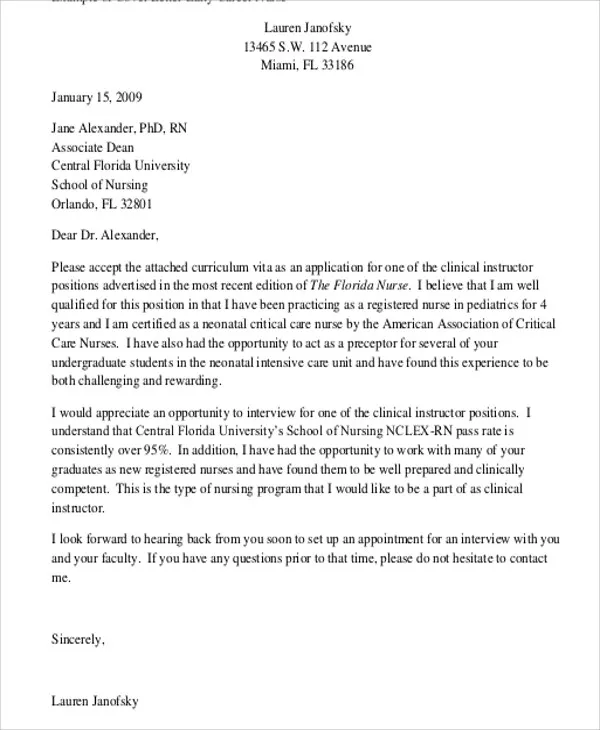Why You Need a Strong Nursing Cover Letter
A well-crafted nursing cover letter is your first impression on a potential employer, and for new nursing graduates, it’s a critical tool. It offers a chance to showcase your personality, passion, and qualifications beyond what a resume can convey. Think of it as your personal introduction, setting the stage for why you’re the ideal candidate. Your resume lists your skills and experience, but a cover letter lets you elaborate, providing specific examples of how you’ve applied those skills in clinical settings. It’s your opportunity to explain your career goals, your interest in the specific position, and your understanding of the healthcare facility’s mission and values. A compelling cover letter demonstrates professionalism, attention to detail, and genuine enthusiasm, significantly increasing your chances of landing an interview.
The Structure of an Effective Nursing Cover Letter
A strong nursing cover letter is structured to be clear, concise, and persuasive. It should follow a standard business letter format, which makes it easy for the hiring manager to read and quickly understand your qualifications. This structure typically includes your contact information, the date, the hiring manager’s information (if available), a professional salutation, the body paragraphs (where you sell yourself), a concise closing, and a professional sign-off. Each section of the cover letter plays a vital role in showcasing your suitability for the role. By adhering to this structure, you provide a well-organized and easily digestible overview of your skills, experience, and your enthusiasm for the position. This streamlined approach shows that you value the recruiter’s time and allows them to quickly assess your qualifications.
Your Contact Information and Date
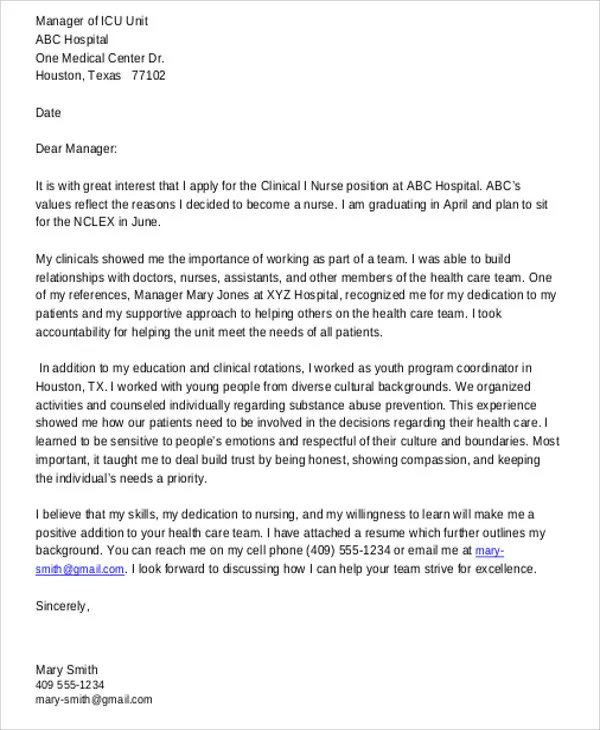
Start your cover letter with your contact information. Include your full name, address, phone number, and professional email address. Make sure your email address is professional; avoid nicknames or unprofessional language. Following your contact information, add the current date. This simple step provides the recruiter with all the necessary ways to contact you easily, should they need to. Using a clear, easy-to-read format for your contact information ensures that the recruiter can efficiently reach you. It also presents a sense of organization and professionalism from the outset of the letter. Ensure all details are accurate, and that your phone number and email are actively monitored so you do not miss important communication about the job.
The Hiring Manager’s Information
If possible, address your cover letter to the hiring manager by name. Research the healthcare facility to find out who is responsible for hiring. A personalized cover letter makes a positive impression by showing you’ve invested time and effort into your application. Use professional titles like ‘Mr.’, ‘Ms.’, or ‘Dr.’ followed by the person’s last name. If you can’t find a specific name, use a general salutation such as ‘Dear Hiring Manager’ or ‘Dear Nurse Recruitment Team.’ Always ensure the name and title are correctly spelled to show your attention to detail. Addressing the letter to a specific person makes it seem as though you are invested in the role and have thoroughly researched the company.
The Salutation or Greeting
The salutation sets the tone for your cover letter. As mentioned, using the hiring manager’s name in the salutation is best. For example, ‘Dear Ms. Johnson.’ If you don’t have a name, use a professional alternative like ‘Dear Hiring Manager’ or ‘To the Nurse Recruitment Team.’ Avoid informal greetings such as ‘Hi’ or ‘Hello,’ as they might not convey the professional image that a nursing role requires. The salutation is your initial engagement; a warm yet professional greeting shows respect and sets a positive tone for the rest of the letter. Make sure the salutation matches the level of formality that the organization demonstrates. This shows you are attentive to detail and professional in your approach.
Body Paragraphs that Stand Out
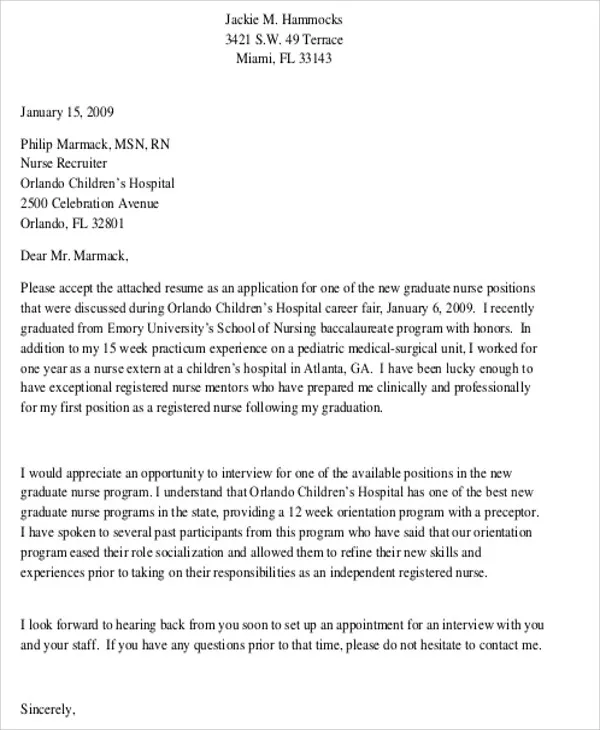
The body paragraphs of your cover letter are where you sell yourself. Start by stating the position you are applying for and how you learned about it. Highlight your relevant skills and experiences. Mention specific clinical skills, experiences with particular patient populations, or any relevant certifications you hold. For example, if the job description asks for experience with electronic health records, be sure to emphasize your familiarity. Quantify your achievements whenever possible – for example, ‘Managed care for a unit of 20 patients daily.’ Explain how your qualifications align with the job description. Tailor each cover letter to the specific job by highlighting the skills and experiences that are most relevant to the position. Demonstrate your enthusiasm for the role and the organization. Show that you’ve researched the facility and are excited about contributing to their mission.
Highlighting Your Skills and Experience
In your cover letter, prominently showcase your nursing skills and experience. For new graduates, this is the opportunity to emphasize the skills you’ve developed during clinical rotations and any related experiences, like volunteer work or research projects. Focus on the skills that the job description highlights as important. Be specific and use action verbs to describe your responsibilities and accomplishments. Examples of nursing skills to highlight include patient assessment, medication administration, wound care, and electronic health record management. Describe the specific experiences you’ve had where you’ve used these skills and the outcomes. If you’ve completed projects or assignments related to patient care, be sure to mention these to show your proficiency in the healthcare field. Use real-life examples that clearly show your expertise and achievements.
Emphasizing Your Education and Certifications
As a new nursing graduate, your education and certifications are crucial. Clearly state your degree (e.g., Bachelor of Science in Nursing) and the institution from which you graduated. List any relevant certifications, such as Basic Life Support (BLS), Advanced Cardiac Life Support (ACLS), or any specialty certifications you may have earned. Include your license status if already licensed. Also, mention any academic honors or awards you received during your nursing program. Highlight any courses or projects that align with the job requirements. Emphasizing your education and certifications shows your dedication to the nursing profession and your commitment to maintaining professional standards. This helps the recruiter understand your base qualifications and ensures you meet the basic requirements for the position.
Demonstrating Your Passion for Nursing
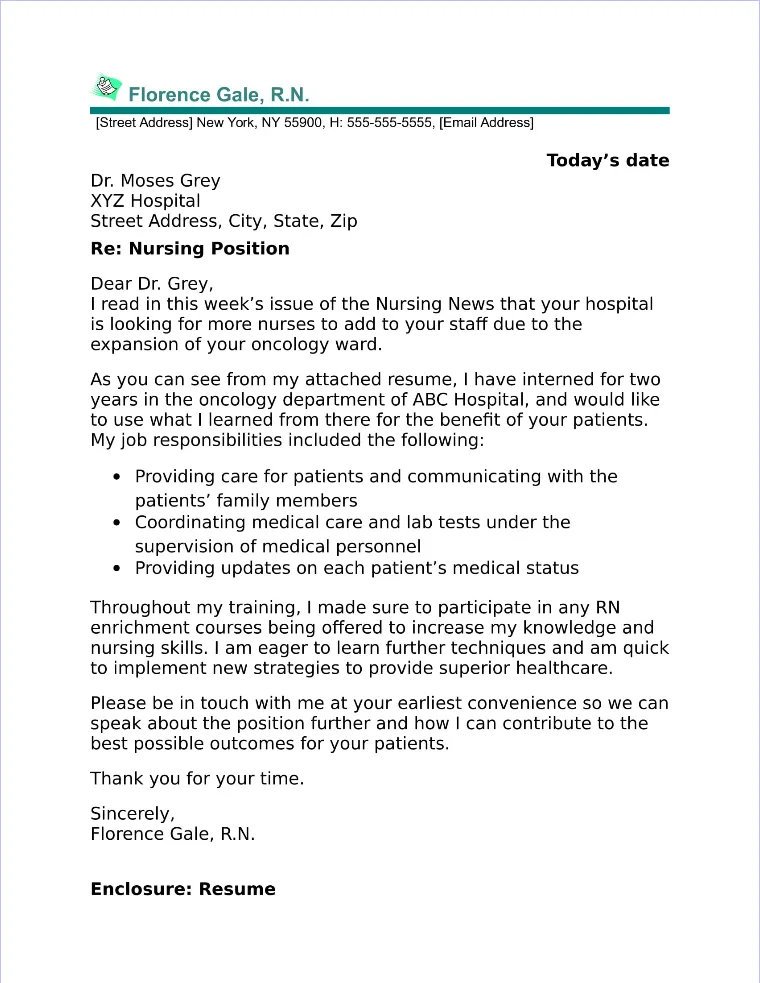
Showcase your enthusiasm for nursing in your cover letter. Explain why you are drawn to this particular role or healthcare facility. Share what motivates you to be a nurse and what makes you passionate about patient care. Talk about your experience, the types of patients you are passionate about working with, and any unique skills you possess. Discuss how your values align with the healthcare facility’s mission. Describe your long-term career goals and how this role helps you achieve them. Your passion for nursing is a key element that sets you apart from other candidates. The hiring managers are looking for candidates who are genuinely interested in patient care and committed to the profession. Demonstrating your passion makes a great first impression and highlights your interest in the position.
The Closing and Call to Action
In the closing paragraph, express your gratitude for the hiring manager’s time and consideration. Reiterate your interest in the position and your enthusiasm to contribute to the team. Include a call to action, such as ‘I am eager to discuss my qualifications further in an interview’ or ‘I welcome the opportunity to speak with you about this role.’ Provide your contact information again in the closing. End with a professional sign-off, such as ‘Sincerely,’ ‘Respectfully,’ or ‘Best regards,’ followed by your full name. This section reiterates your interest and makes it easy for the recruiter to follow up. A strong closing paragraph reinforces your professionalism and makes a lasting impression on the reader.
Essential Cover Letter Tips for New Nursing Graduates
Aside from the structural elements, several tips can boost your cover letter’s impact. Ensure that your cover letter reflects your genuine personality while staying professional. Avoid clichés and generic statements, and tailor each cover letter to the specific job. Carefully check for any grammatical errors or typos. Be concise; aim for one page in length, focusing on your most relevant skills and experiences. Emphasize the skills that match the requirements of the job. Always include a call to action at the end, requesting an interview. Highlighting the importance of these tips ensures your cover letter stands out. This demonstrates your professionalism, attention to detail, and genuine enthusiasm for the role.
Use Action Verbs
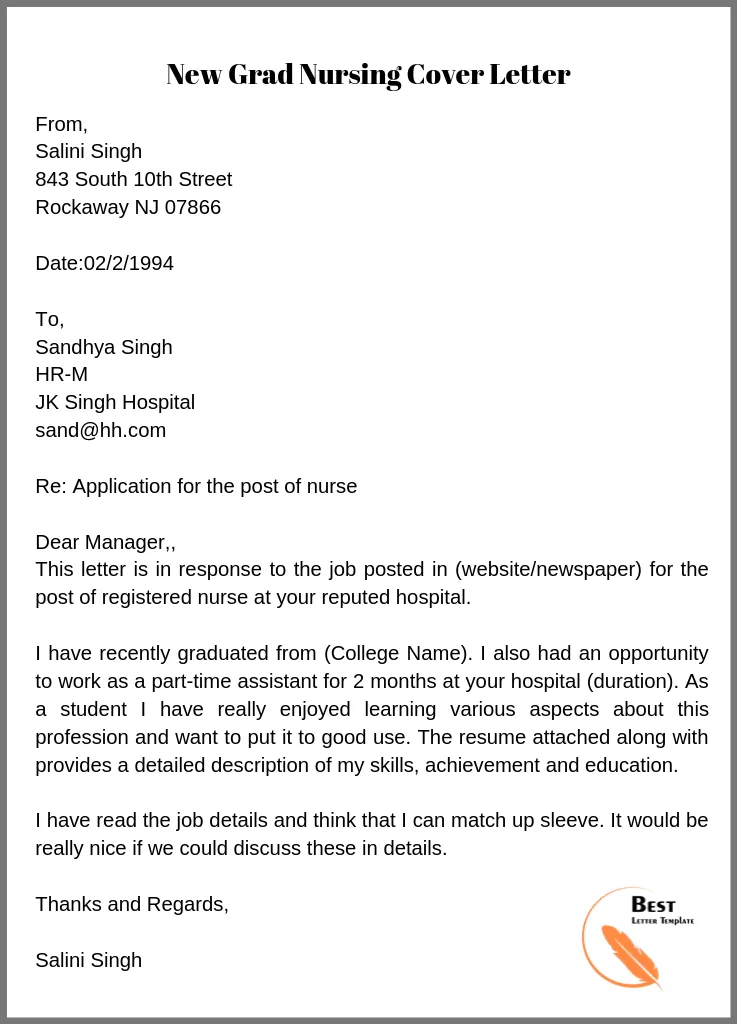
Use action verbs to describe your accomplishments and responsibilities in your cover letter. Action verbs make your statements more dynamic and compelling. Instead of saying ‘Responsible for patient care,’ try ‘Managed patient care,’ or ‘Administered medications.’ Use verbs like ‘Assessed,’ ‘Collaborated,’ ‘Implemented,’ ‘Educated,’ ‘Coordinated,’ and ‘Advocated.’ Action verbs highlight what you did and the impact of your actions. This approach provides specific examples of your skills and makes it easier for the recruiter to understand your expertise. By using powerful action verbs, you effectively communicate your achievements and impress the hiring manager. This helps your cover letter stand out and shows a proactive and results-oriented approach.
Tailor Your Letter to the Specific Job
Customization is key in a nursing cover letter. Never send a generic cover letter. Always tailor your cover letter to each job you apply for. Review the job description carefully and highlight the skills and experiences that the employer seeks. Use the keywords from the job description in your cover letter, showing that you understand the role’s requirements. Mention the healthcare facility’s name, values, and mission in your letter to show that you’ve done your research. This personalized approach demonstrates your interest and helps the recruiter understand that you are a perfect fit for the role. This shows you have taken the time to understand the specific needs of the role and are the best candidate for the job.
Proofread Carefully
Proofreading is a crucial step that is frequently overlooked. Errors in grammar, spelling, or punctuation can undermine your credibility. Before submitting your cover letter, carefully read it for any mistakes. Ask a friend, family member, or career advisor to proofread it for you, as a fresh pair of eyes can often catch errors that you missed. Ensure that your formatting is consistent throughout the document. Check all contact information for accuracy. A flawless cover letter reflects your attention to detail and professionalism, demonstrating to the recruiter that you pay close attention to your work and that you are a strong candidate. Proofreading is essential; it demonstrates that you care about the application and will bring that same care to your nursing role.
Cover Letter Examples Nursing Graduate
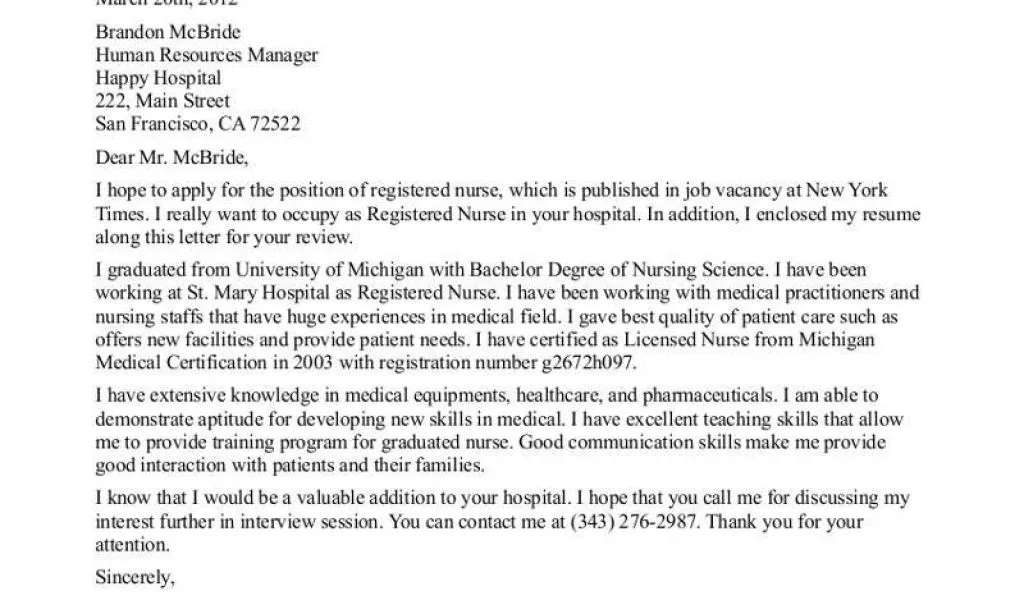
Reviewing cover letter examples specifically designed for new nursing graduates can be extremely helpful. These examples provide a template for structuring your letter, highlighting relevant skills, and demonstrating your passion for the profession. By studying these examples, you can grasp the best ways to present your credentials and experiences. Pay attention to how the examples address the hiring manager, showcase their education and certifications, and express enthusiasm for the role. Use these examples as a guide to create a unique and customized cover letter that reflects your individuality and aspirations. Customize these templates by adding your personal experiences, skills, and achievements. This will increase the impact of your cover letter and make it stand out to the recruiter.
Example 1 General Nursing Position
This example is suited for general nursing positions where the requirements are broad. It emphasizes the core skills such as patient assessment, medication administration, and patient education. The letter demonstrates an understanding of basic nursing procedures and a willingness to learn and grow. The general nursing role allows you to highlight all of your skills. If you are a new graduate, this would be a great option as it allows you to showcase your base level knowledge. Start by stating your goals, and then go into the details of why this is the perfect match for you. Emphasizing your passion for nursing can also give your cover letter a boost.
Example 2 Nursing Role with Specialization
Use this example if you’re applying for a specialized role, such as a critical care nurse, a labor and delivery nurse, or a psychiatric nurse. Tailor the letter to highlight your specialized training and experience. If you have specific certifications or coursework, be sure to mention these. Emphasize the aspects of the role that highlight your skills. Highlight skills and experiences that are relevant to the specialized field. Demonstrate how you would be a successful applicant and how you stand out from the rest of the pool of applicants. Focus on your specialized training and how you have worked with your specialty. Demonstrating how your skills are in alignment with the role you are applying for is key.
Example 3 Leadership Nursing Role
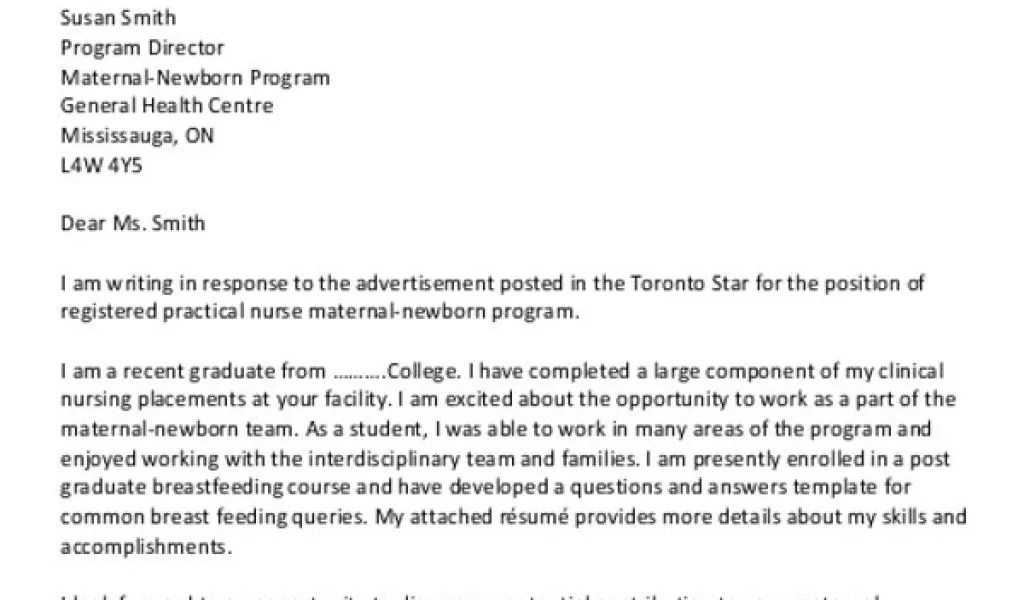
This is a good option if you’re applying for a leadership role, such as a charge nurse or a nurse manager. This example focuses on leadership skills, such as team management, problem-solving, and decision-making. Highlight any leadership experience you have, such as leading student groups or taking on leadership roles in your clinical rotations. This example will want to showcase your skills that make you the ideal leader for the role. This may involve skills such as managing conflict, and problem-solving, as well as the ability to encourage teamwork and collaboration in order to create the best patient outcomes possible. If you have experience with specific programs or initiatives, include these to highlight your qualifications.
Common Mistakes to Avoid in Your Nursing Cover Letter
When writing a nursing cover letter, avoid common mistakes. Ensure your cover letter is well-written, clear, and focused. Steer clear of generic, impersonal language. Avoid simply restating your resume; instead, use the cover letter to elaborate on your skills and provide context. Do not include any negative or unprofessional statements. Be professional and show how you would be a good fit for the role. A cover letter that is too long will also be ineffective; recruiters are busy, so you want to make your point efficiently. A common mistake is not tailoring your cover letter to the specific job; always customize it to show you understand the role’s requirements. Finally, proofread it multiple times to avoid any errors that could undermine your application.
